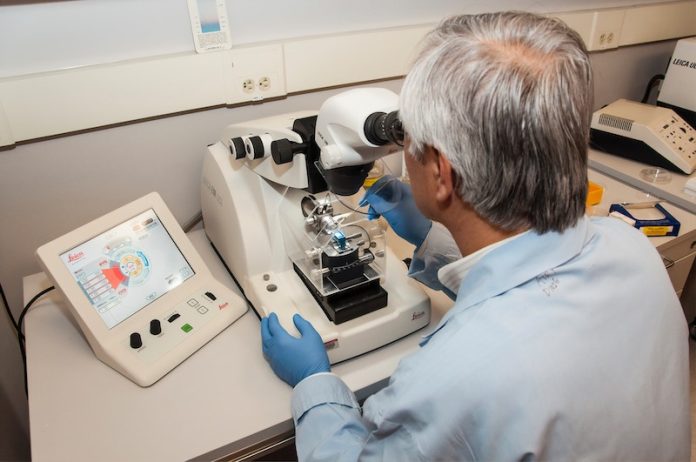
Prostate cancer is a nasty beast that takes too many lives. It’s a big deal, especially for men, because it’s one of the leading causes of cancer death for them.
Think of it as that tough, stubborn bully who doesn’t play by the rules and often doesn’t respond to the treatments that work for other types of cancer.
The Big Gun That Usually Works: Cisplatin
There’s a drug called cisplatin. It’s a really powerful medicine that can knock out many kinds of cancer.
It’s like a superhero flying in to save the day against the evils of testicular, breast, bladder, lung, and ovarian cancers. It does this by damaging their DNA, which basically destroys these cancer cells.
But with prostate cancer, it’s a different story. Cisplatin just doesn’t work well against it. It’s like our superhero has met its kryptonite.
Scientists have been scratching their heads over this for a long time. It’s a big mystery, like why socks disappear in the washing machine.
The Food That Fuels The Bully: Fatty Acid Oxidation
Cancer cells, like all cells, need food to survive. They need to eat to grow and divide. And what does the prostate cancer cell like to eat? Fatty acids.
You know, the stuff that most of us are trying to burn off in the gym. When prostate cancer gets serious, it gobbles up even more fatty acids.
This shift in diet is called moving from “glycolysis” to “fatty acid oxidation”. Don’t get scared by these big words.
Think of it as switching from a carb-heavy diet (glycolysis) to a high-fat one (fatty acid oxidation), kind of like going from eating a bunch of pasta to chowing down on cheeseburgers.
The Bright Idea: Let’s Mess with the Food Supply
So, some smart people at the University of Miami, led by Shanta Dhar, thought, “What if we could mess with this fatty acid oxidation process?
What if we could cut off the food supply to these prostate cancer cells?” And that’s exactly what they decided to do.
They wanted to create a treatment that makes it hard for prostate cancer cells to use fatty acids.
If they could do that, they thought, maybe the cells would become weak and vulnerable to cisplatin. It’s like taking away the bully’s lunch so he becomes too weak to cause trouble.
The Lab Experiment: Birth of the Super Prodrug
The researchers looked at lots of different compounds that had cisplatin in them.
It was like having a baking contest to see who could make the best cake using the same main ingredient. The winner was a compound called Platin-L.
Platin-L is a cisplatin-containing prodrug. “Prodrug” is just a fancy way of saying it’s a drug that only works when it’s broken down by the body.
It’s like a toy that needs to be assembled before you can play with it. Platin-L works by binding to a specific protein that’s really important for transporting fatty acids.
When Platin-L binds to this protein, it messes up the whole fatty acid oxidation process. The prostate cancer cells get starved and weakened.
The tests they did showed that Platin-L can reduce the growth of prostate cancer cells by more than 50%. That’s like having a diet that helps you lose half your weight!
The Next Step: Super Prodrug in a Handy Pill
For a treatment to work in real life, it needs to be easy to use. So the researchers made a version of Platin-L that can be taken by mouth.
They put Platin-L into tiny particles that target the prostate cancer cells. It’s like putting a GPS system on the drug so it knows exactly where to go.
When they tried this new treatment on mice with prostate cancer, the results were amazing. The cancer in these mice shrank a lot.
On top of that, the mice didn’t lose weight and lived longer. Even better, they didn’t have nerve damage, which can be a nasty side effect of some cancer treatments.
The Bigger Picture: A New Hope for Other Cancers
The exciting thing about this discovery is that it could help treat other types of cancer, too. That’s because many cancers, not just prostate cancer, love to eat fatty acids.
So this new Platin-L therapy could be a game-changer for lots of people. It’s a big step forward in our fight against the nasty cancer beast.
But remember, while it looks promising, it’s still early days and more work needs to be done. But hey, it’s a great start!
Isn’t it wonderful what can happen when bright minds tackle tough problems? It gives us all hope for a future where cancer is a word of the past.
If you care about cancer, please read studies about new vaccines to prevent pancreatic cancer, and scientists find the cause of prostate cancer metastasis.
For more information about cancer, please see recent studies about an effective drug combo to treat liver cancer, and results showing this berry may protect you from cancer, diabetes, obesity.
The study was published in ACS Central Science.
Follow us on Twitter for more articles about this topic.
Copyright © 2023 Knowridge Science Report. All rights reserved.



